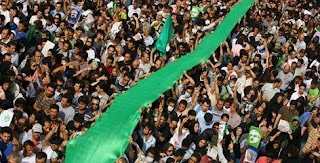 There has been much excitement, especially in the Western media, about what has been going on in Iran over the past few weeks. Some commentators – concentrating mostly on the superficial similarities between the demonstrations then and now – have even gone so far as to compare events with the days that shook the world almost exactly 30 years ago, leading to Khomeini’s return to Iran and the establishment of the Islamic Republic. But such comparisons are far from justified: they simplify, and overestimate the differences between Ahmadi-Nejad and his opponents. Both are very much products of the current Iranian establishment – Musavi perhaps even more than the incumbent.
There has been much excitement, especially in the Western media, about what has been going on in Iran over the past few weeks. Some commentators – concentrating mostly on the superficial similarities between the demonstrations then and now – have even gone so far as to compare events with the days that shook the world almost exactly 30 years ago, leading to Khomeini’s return to Iran and the establishment of the Islamic Republic. But such comparisons are far from justified: they simplify, and overestimate the differences between Ahmadi-Nejad and his opponents. Both are very much products of the current Iranian establishment – Musavi perhaps even more than the incumbent.This is not a popular uprising – rather, it is a classical intra-elite affair, where different factions within the Iranian leadership use ‘the masses’ to improve their positions in a struggle for power. Let’s not forget that Musavi was prime minister during the heyday of the Islamic Republic, when Ayatollah Khomeini – the same Khomeini who issued the fatwa against Salman Rushdie – was supreme leader. One of his allies is none other than Mohsen Razai, a former commander of the Pasdaran – the Revolutionary guard – known for its ideological rigidity. Musavi is openly supported by former president Hashemi Rafsanjani – known for both his pragmatist (and self-enriching) tendencies within Iranian society, but still a pillar of Iran’s clerical establishment. A change from Ahmadi-Nejad to Musavi could perhaps modify the style and form of Iranian discourse (no more “wiping Israel of the map”), but it would not even dent the fundamental principle of the Islamic Republic – Velayat-e Faqih, Guardianship of the Jurisprudent, that uneasy combination of electoral democracy and theocracy. It would, moreover, still leave the most fundamental levers of power – control of the military and, especially the Revolutionary guard, and all security forces – safely in the hands of the supreme leader, Ayatollah Khamenei. At best, one could get a return to the Khatami era, where the freedom of movement of a reformist president was easily frustrated and limited by the ever-dominant conservatives in the Guardianship Council and the Assembly of Experts.
And as for the nuclear issue – while Musavi might perhaps be more susceptible to outside pressure (partly because of his more liberal take on Iran’s ramshackle economy), the conservatives within the security establishment would most likely ensure continuity there as well. As Al-Baradei correctly pointed out this week, Iran has very deep-seated motives to either obtain a nuclear bomb outright, or, at the very least, master the technology required to manufacture one at short notice. First and foremost come state and regime security – the contrast between Iraq and North Korea would indeed lead any government to see nuclearisation as the ultimate guarantee of survival. A quick look at the map also shows how Iran is surrounded by nuclear powers – Russia, Israel, Pakistan – two of whom obtained their nuclear capability outside the NPT. How could Iran realise its long-standing claim to regional power status without a nuclear arsenal?
What many – especially in the West – tend to forget is that the country’s nuclear programme was started in 1958 by the Shah, who thought imperial Iran wouldn’t be quite that imperial without ‘the bomb’. The Islamic Republic decided to restart the programme in the final years of the Iran-Iraq war – partly in response to lessons drawn from that war, partly, also, out of a long-held conviction that Iran – the Mellat-e Bozorg-e (Great Nation) – would have to find its place in the world. Iran’s nuclear propensities survived the Iranian revolution; and just like the Islamic Republic, they’ll most likely survive what comes next.